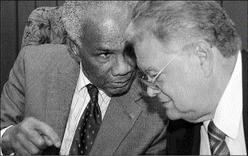
Minister of Industry, Commerce and Investments, Karl Samuda (right), listens intently to Dr. Carlton Davis, Cabinet Secretary, at yesterday's post-Cabinet press briefing at Jamaica House. - Rudolph Brown/Chief Photographer
Edmond Campbell, News Coordinator
The Port Authority of Jamaica has accepted a Cabinet proposal to reduce the US$5 cess on imported cement, clearing the way for players in the industry to import 60,000 tonnes of the product to ease the current shortage affecting the construction sector.
At the same time, a Jamaican delegation will be heading to Cuba this week to finalise arrangements between the two countries for the importation of some 40,000 tonnes of cement. This will be brought into the island on a phased basis.
Minister of Industry, Commerce and Investments, Karl Samuda, told journalists at yesterday's post-Cabinet press briefing at Jamaica House that the charge had been reduced to US$1.
Importers had given the Government a commitment that if it significantly cut the levy on cement, they would be able to supply 30,000 tonnes to the market in October and a similar amount in November.
Caribbean Cement Company Limited (CCCL), at a recent press conference, pledged to supply 75,000 tonnes of cement per month to the market.
With an average market demand of 88,000 tonnes per month, Mr. Samuda said the importation of the commodity would satisfy the current requirement.
Storage facility
The Government has also moved to provide storage facility at minimal costs to importers of cement.
"The activities that are planned for the rest of this year and into the medium term that demand a certain minimum quantity of cement, as an administration, we would be irresponsible if we took the risk of operating on this thin a margin," Samuda said.
Mr. Samuda has castigated CCCL for indicating that it would have increased the price of cement by at least six per cent and instead, introduced an 8.5 per cent hike.
"I am downright angry that the cement company could have met with us last week, discussed the possibility of an increase in a rather fleeting manner, suggested an increase of between five and six per cent, but never pursued the discussion," he told journalists.
Acknowledging that it was supply and demand that determined price, Mr. Samuda said his Government would ensure that there was no advantage to any one player and would move to create a level playing field.
"So, we will use whatever leverages we have in Government to ensure that no one gets preferential treatment and no one is able to exploit their dominant position at the expense of the consumers of the country."
edmond.campbell@gleanerjm.com

